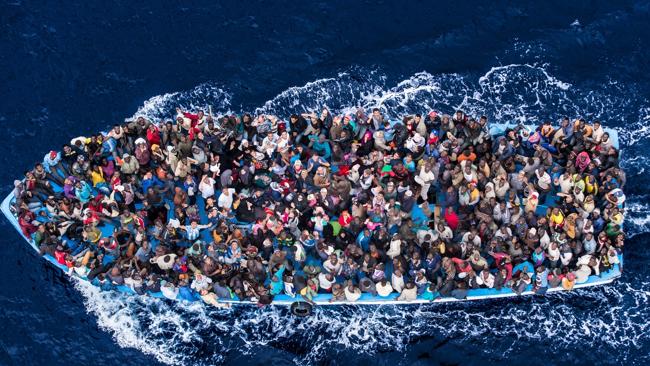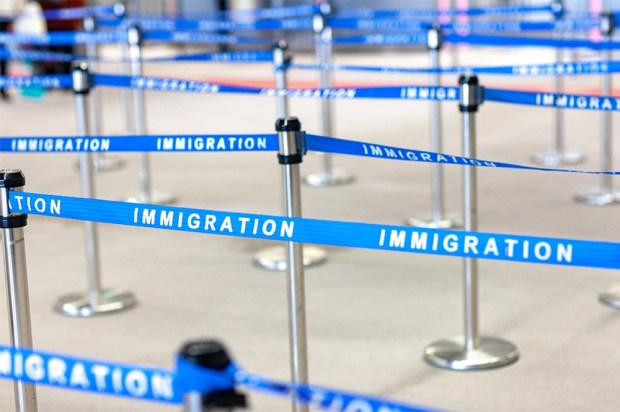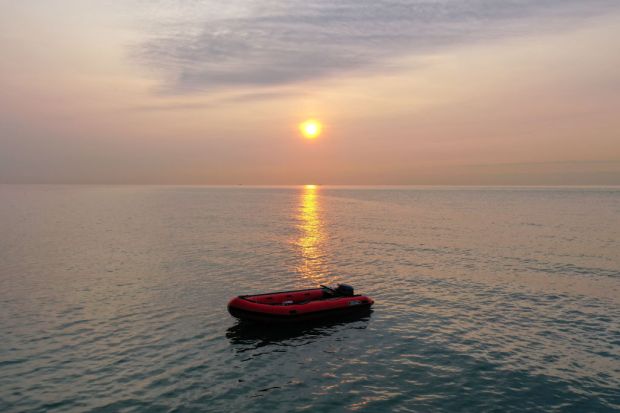One Friday, 28 people were rescued by the Italian coastguard when the boat on which they were fleeing Libya capsized in the Mediterranean. Arriving homeless and without prospects in a strange land, these were — relatively speaking — the lucky ones. As many as 700 are thought to have drowned. Add them to the tally. On Monday, another boat capsized with 400 souls feared lost. Last year more than 3,000 died in the Mediterranean trying to get to the West. It has become a phenomenon of our times.
We do not hear much about life in the supposedly liberated Libya, but the fact that even immigrants into Libya would rather risk death than stay there gives a fair idea. Were these survivors being routinely scooped out of the sea by the British rather than Italian coastguard, it might focus our minds on just how things have developed since David Cameron stood in Martyrs’ Square in -Tripoli and declared that Libyans had ‘no greater friend than the United Kingdom… We will stand with you every step of the way.’
Britain did not, in the end, stand with the Libyans. It was judged too expensive. The new government in Tripoli failed to control the insurgent groups that flourished during the campaign against Gaddafi so now they are firmly established, waging bloody turf wars. The resulting chaos has created the space for Isis to grow. One of its recent videos from the region showed 21 Egyptian Christians being decapitated on the shores of the Mediterranean. A reminder that what goes on in the Middle East does not stay in the Middle East.
As Libya collapses into violence, its great friends in London and Washington have effectively turned a blind eye. There is a general election on, and everyone would prefer to think about other things. In Britain, politicians speak proudly of increasing the foreign aid budget to 0.7 per cent of the national income, but the money sent to Libya has not created a successful state. The country has had seven prime ministers in four years, and its promising democratic beginnings have yielded to sectarianism. As in Iraq, the ultimate victors look like being Islamic fundamentalists — from whom Libyans are now trying to flee in vast numbers. Italy, the closest European country, is taking almost all of the strain.
In many ways, Cameron made the same errors in Libya that Tony Blair made in Iraq. He sent in forces to help remove a hated dictator, and did so on the (commendable) premise that Britain is a country that shapes the world for the better. He trumpeted the elections that followed, made a visit to the country he believed he had helped to liberate — and then looked the other way as it slipped into anarchy. As with Blair’s intervention in Iraq, initial bravado concealed a woeful lack of planning for the aftermath.
The difference between Blair’s Iraq and Cameron’s Libya is a lack of British casualties. Thanks to that, the intervention of 2011 is easier to forget: we don’t have to live with the consequences. The Libyans do. It was right to depose Colonel Gaddafi. But as the military advised Cameron at the time, such operations do not end when the dictator dies. What follows is crucial, and Britain should have offered full support. Even if it ended up being more costly, drawn-out and politically complicated than had been envisaged.
The election campaign has plenty to say about immigration from eastern Europe, which almost everyone seems to be at pains to say they will bring under control. Yet none of the parties have said what, if anything, they intend to do about the problem of refugees from Libya, 150,000 of whom have arrived in Italy since the start of last year and many more of whom are likely to arrive as the Islamists become more brutal. As we have seen, writing large cheques for overseas aid is no substitute for the support offered by a proper military. The Labour-Tory consensus on shrinking the military can only mean more botched jobs.
We have heard about the renewal of Trident, yet nothing about how the parties would approach a problem like Libya. Why not? Surely anyone who aspires to be Prime Minister ought to share with us some thoughts on how, as leader of what is still one of the most powerful and influential countries on earth, they would tackle the issue of whether to intervene in a future crisis. Why is the Royal Navy (and the navies of Norway, France and Spain) not offering to join the Italians in patrolling the waters and helping with this crisis? All of these countries joined the 2011 bombing campaign; do they not have a duty to deal with what ensues?
No one is pretending that these are easy decisions to make. That David Cameron went, in the space of 12 months, from proposing air strikes on President Assad of Syria to backing strikes on Assad’s enemies shows just what a quagmire foreign policy can be. But when choosing a leader we have a right to know they will exert leader-ship. Cameron was right: Libya deserves Britain’s friendship. Those who aspire to be Prime Minister should take just one day out from making promises about the NHS to spell out what that friendship should mean.
Got something to add? Join the discussion and comment below.
Get 10 issues for just $10
Subscribe to The Spectator Australia today for the next 10 magazine issues, plus full online access, for just $10.
You might disagree with half of it, but you’ll enjoy reading all of it. Try your first month for free, then just $2 a week for the remainder of your first year.














Comments
Don't miss out
Join the conversation with other Spectator Australia readers. Subscribe to leave a comment.
SUBSCRIBEAlready a subscriber? Log in